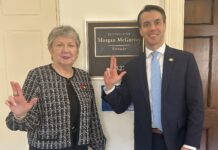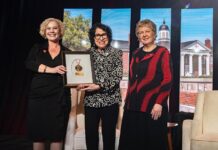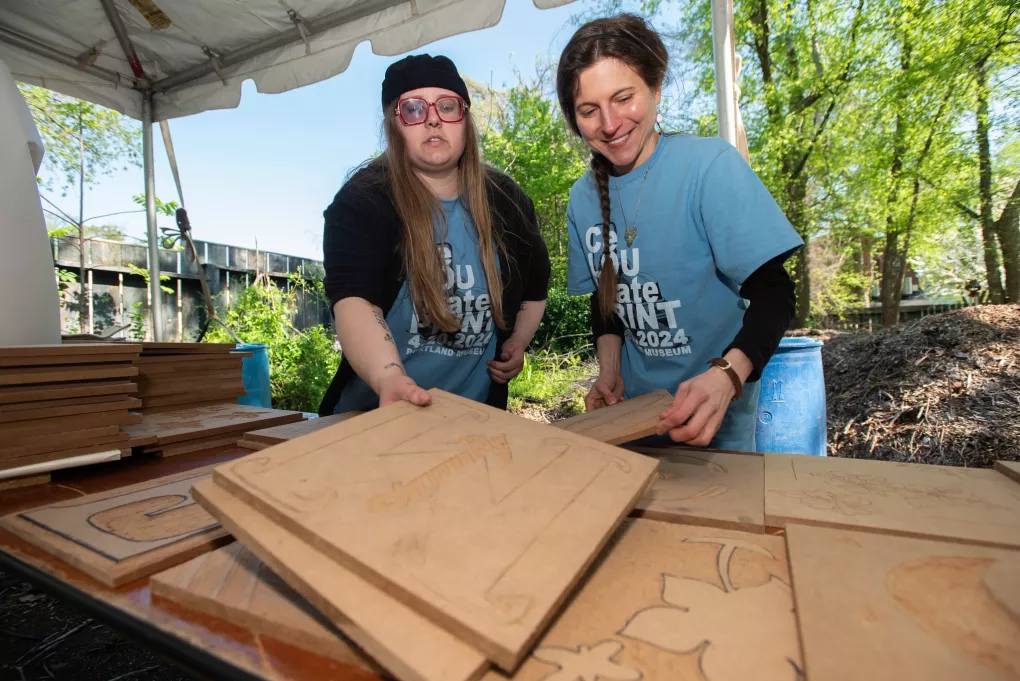Just like a small gesture can make a difference in someone’s day, even the smallest grant can spur the biggest impact in community lives.
In 2021, the University of Louisville’s Office of Community Engagement began giving one-time mini grants to faculty, staff and Recognized Student Organizations (RSOs) for a project that directly benefits a community through outreach, research or direct service.
Funded by the Gheens Foundation, the program provided mini grants ranging from $500 to $3,000 to more than 20 UofL faculty, staff and students in 2023. The projects – ranging from offering free health care screenings and administering oral health care to homebound patients to printmaking – are making an impact here in Louisville and beyond.
Douglas Craddock, vice president of community engagement at UofL, said the idea was born from connecting the community and university.
“It’s really speaking to the voice of what the community needs by providing funding behind that,” Craddock said. “So, they are mini grants, but we call them more so ‘seed-funding’ because they’re really meant to plant on that fertile ground that exists within the community to grow something larger and bigger.”
Bringing compassion to the community
Each grant is required to help underrepresented communities in Louisville, rural areas or internationally.
The Gheens Foundation was founded by Louisville native C. Edwin Gheens. The foundation aims to improve the quality of life for residents in Louisville and the Laforche and Terrebone parishes in Louisiana, according to its website.
A $598 Gheens grant allowed UofL’s Compassion Clinic – a student-run initiative that provides health screenings and education – to purchase tablets and collect data, according to Karen Krigger, a physician who helps lead the clinic.
“If you look at the data that we’ve collected in the city since 2007, when they first started collecting information about the social determinants of health and equity in the city of Louisville, we haven’t changed anything in any of the targeted areas,” Krigger said.
Now, thanks in part to the equipment purchased, the data collected by the clinic will be presented to Research!Louisville.
Through its volunteers, which include undergraduate and graduate students, staff and faculty, the Compassion Clinic aims to change that by providing health screenings, gun locks, NARCAN drug antidote kits and general education including baby safety and dental health.
The screenings not only benefit those who need them but also are training the future generation of health care workers to look at their community and the community needs.
“We’re training them to understand health inequities and to gather the data to move the needle,” Krigger said. “It’s important for them to understand the social determinants that prevent people from being healthy and maintaining longevity because we’re going into areas where the life expectancy is 10 to 12 years less than other areas of Jefferson County.”
Craddock said that projects such as the Compassion Clinic demonstrate the university’s investment in the local community.
“There’s a lack of trust from the community to larger institutions and organizations, so this type of work increases the validity,” Craddock said. “Also, that the university does not just feel that the community is here just to be here, but they’re part of the work that we do day in and day out across the board.”
Creating space for the arts
Other projects funded as part of the mini grants include training home care providers how to provide oral hygiene to homebound patients and a project in which urban and public affairs graduate students will help determine the best community use of the Arts and Enrichment Center in Charlestown, Indiana.
“Oftentimes, we stop a lot of the work that we do around the state borders and don’t think about individuals across the river that do the majority of their work within Louisville and the impact they make,” Craddock said. “So, I think the Charlestown grant provides the chance for us to extend our outreach even further than we may realize.”
For others like Erica Lewis, the $1,000 Gheens mini grant was the first funding her team received, allowing her to put on a community event at the Portland Museum in northwest Louisville called CeLOUbrate Print.
In several of my community workshops, I have heard adults lament that they have not made art or taken time to do a creative activity in years. Adults should be allowed to play and create and express without any expectation of productivity or profitability.
– Erica Lewis
Lewis, a doctoral student in comparative humanities, collaborated on the event with Rachel Singel, associate professor of fine arts. The event offered community residents the chance to create free, large, hand-carved wooden stamps – also known as woodcuts – by driving them over with a steamroller.
CeLOUbrate Print aimed to take the traditional medium of printmaking outside of its usual institutions of a university or for-profit print shop to teach its history.
“As someone who loves the craft, I wanted my project to address the gatekept inaccessibility of the medium,” Lewis said. “Oftentimes, people do not have access to the knowledge, equipment or resources to create their own prints, so I wanted to create a space for local artists to come together with an invitation to community members.”
Lewis said the project, along with her other free workshops, connected over 100 members of the community to local organizations and each other.
“The project as a whole came to embody participatory community-engaged art, in which sharing knowledge and making together became an act of collective art in its own right,” she said.
“In several of my community workshops, I have heard adults lament that they have not made art or taken time to do a creative activity in years,” Lewis said. “Adults should be allowed to play and create and express without any expectation of productivity or profitability.”
To read and learn more, take a look inside the fall/winter 2024 issue of UofL Magazine.





























